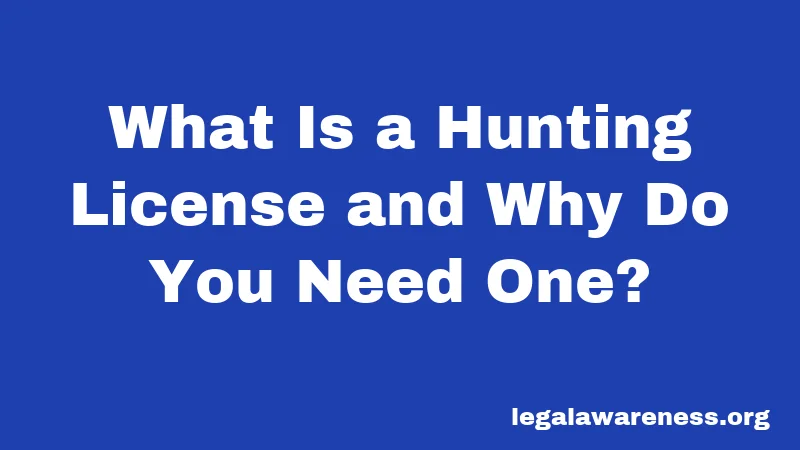Tennessee Hunting Laws in 2026: Everything You Need This Season
Most people have no idea how many rules come with hunting in Tennessee. Seriously. But here’s the thing—if you hunt here, you need to know them. The penalties for breaking these laws can be pretty serious. Fines, lost hunting privileges, even jail time in some cases. Let’s break down exactly what you need to know before heading out.
Whether you’re a first-timer or you’ve been hunting Tennessee’s hills for years, this guide covers the basics. From getting the right license to understanding bag limits, we’ll walk you through it all.
What Is a Hunting License and Why Do You Need One?

Think of a hunting license like a driver’s license for hunting. It’s your official permission slip from the state. You’re gonna love this: it’s actually pretty straightforward to get. The Tennessee Wildlife Resources Agency (TWRA) issues these licenses. They make sure hunters are properly trained and following the rules.
Here’s who needs one. Anyone 13 or older who hunts for any game has to have a valid license. The only exceptions? Landowners hunting on their own farmland, kids under 13, and a few other specific groups. If you try to hunt without a license, you could face fines ranging from $50 to $500.
Getting Your License: The Basics
You can purchase a Tennessee hunting license through the official TWRA website called GoOutdoorsTennessee.com. Licenses go on sale February 18th each year. Here’s what you need to know about the prices.
Resident Licenses (for people who live in Tennessee):
- Annual Hunting License: $34
- Junior License (ages 13-15): $10
- Senior License (age 65+): $50 (permanent)
- Lifetime Sportsman License: Various prices based on age
Non-Resident Licenses (for visitors from out of state):
- 3-Day License: $111
- Annual All-Game License: $305
- Non-residents born in Tennessee can get special rates
Processing fees of $0.50 to $5.00 apply to all purchases. Your license is valid from the date you purchase it until 365 days later.
Need a quick tip? You’ll need a Social Security Number to buy a license. That’s a federal requirement. Make sure you have it handy when purchasing online or at a vendor.
Hunter Education: Do You Need It?

Here’s a quick one that surprises people. If you were born on or after January 1, 1969, you need proof of hunter safety certification. Yep, that’s pretty much everyone under 55. The minimum age to get certified is 9 years old.
You must carry proof of your certification when hunting. You can’t leave it at home or in your truck. TWRA officers will ask to see it.
Wondering if you can hunt without it? Not legally. Violating this rule is a misdemeanor. You could face fines and lose your hunting privileges for a year. Not worth it.
There’s one option: the Apprentice Hunting License. Tennessee residents 10 and older can purchase this for around $10. It lets you hunt for one year without your safety certificate. But you must hunt under the direct supervision of an adult (21+) who has their certification. This license can only be purchased once in your lifetime.
Understanding Hunting Seasons: When You Can Hunt
Tennessee divides hunting into specific seasons. Each game type has its own timeframe. The TWRA sets these dates based on wildlife population studies. Here’s what matters most.
Deer Hunting is the biggest deal in Tennessee. It runs from late September through early January. The state breaks it into three parts: archery season, muzzleloader season, and gun season. This year, gun season opens November 22, 2025 and runs through January 4, 2026.
Turkey Hunting comes in spring and fall. Spring season is late March through mid-May. Fall season opens in October in certain counties. Each county has different rules, so check before you go.
Small Game like squirrels and rabbits have longer seasons that run through most of the fall and winter.
Waterfowl follows federal regulations set by the U.S. government, not just Tennessee. You need a federal duck stamp plus a Tennessee waterfowl permit.
Can’t remember the exact dates? Visit the eRegulations website or get the official 2025-26 Tennessee Fishing, Hunting, and Trapping Guide. The guide is released in July each year and includes everything.
Bag Limits: How Many Animals Can You Take?

Bag limits are super important. This is the maximum number of animals you’re allowed to harvest. These limits exist to keep wildlife populations healthy. And they’re serious—exceeding them is illegal.
Deer Bag Limits for the 2025-26 season:
- Antlered (bucks): Two per season, but only one per day
- Antlerless: Varies by region (either 2 or 3 per day)
The bag limit can increase if you’re in a Chronic Wasting Disease (CWD) area and participate in the Earn-a-Buck program. This program encourages hunters to harvest antlerless deer to help manage the disease.
Turkey Bag Limits:
- Spring: 2 male turkeys (only one can be a younger “jake”)
- Fall: 1 turkey total for the season
Small Game:
- Squirrels: 10 per day
- Rabbits: 10 per day
- Limits vary by species and region
Here’s the deal: possession limits are usually double the daily bag limit. But not for migratory birds or on your first hunting day. Keep track of what you harvest. TWRA officers can check and count your animals.
Fluorescent Orange Safety Requirements
Okay, pause. Read this carefully. This one’s crucial.
Tennessee law requires hunters to wear bright orange for safety. It’s not optional—it’s required during big game seasons (like deer and elk hunts). The rule: you need 500 square inches of solid fluorescent orange visible from all sides on your upper body.
Here’s what counts:
- A fluorescent orange hat
- A fluorescent orange vest or jacket
- Fluorescent orange arm bands
A hat alone doesn’t cut it. You need actual coverage on your body. And here’s a newer rule: fluorescent pink now meets this requirement too. Starting in 2025, you can wear pink instead of orange if you prefer.
The penalty? You could face a fine. More importantly, you’re risking your safety. That bright color helps other hunters see you.
Equipment Rules: What You Can and Can’t Use
Tennessee has strict rules about hunting weapons and gear. Different animals require different equipment. Stay with me here.
For Deer:
- Shotguns with single-projectile ammo are allowed (not buckshot loaded with multiple balls)
- Rifles with centerfire ammunition work
- Rim-fire rifles are NOT allowed for deer
- Archery equipment (bows, crossbows, arrows with broadheads) is legal
For Waterfowl:
- Shotguns only (no rifles or handguns)
- Non-toxic shot required (federal law)
- Shotguns cannot hold more than 3 shells total
Prohibited Equipment:
- Silencers on firearms
- Explosive or poisoned ammunition
- Electronic light-enhancing devices on archery equipment
- Laser sighting devices during certain seasons
Trust me, this one’s important. Using prohibited equipment is a misdemeanor. You could face fines up to $500 and lose your hunting license.
Chronic Wasting Disease (CWD) Regulations
This part can be tricky, honestly. Chronic Wasting Disease is a serious illness affecting deer. Tennessee has a CWD Management Zone that includes 22 counties in West and Middle Tennessee.
If you hunt in these counties, special rules apply. The most important one? Carcass transportation restrictions.
You CANNOT move these parts outside the CWD Zone:
- Whole or field-dressed carcasses
- Organs or guts
- Uncleaned heads or brains
- Any part attached to the spine
You CAN move these parts anywhere:
- Deboned meat (completely removed from bone)
- Cleaned skulls with no meat or tissue attached
- Antlers
- Finished taxidermy work
- Hides and tanned products
There’s another rule: you cannot use grain, salt, or minerals to bait deer in the CWD Management Zone. Feeding deer unnaturally brings them together, which spreads the disease.
The CWD Zone covers these counties: Benton, Carroll, Chester, Crockett, Decatur, Dyer, Fayette, Gibson, Hardeman, Hardin, Haywood, Henderson, Henry, Lake, Lauderdale, Lewis, Madison, McNairy, Obion, Shelby, Tipton, Wayne, and Weakley.
New Baiting Law for 2025
Hold on, this one’s important. Tennessee changed its baiting rules effective July 1, 2025.
You can now hunt deer over bait, but you need a special license. The license costs $50 for residents and $100 for non-residents. Every person in your hunting party must have this license if you’re hunting over bait.
Here’s what the law says: everyone in your group needs one. Even if they don’t normally need a hunting license, they need this special bait license. The TWRA will set rules by August 1, 2026 about what counts as acceptable bait and how much you can use.
Violating baiting regulations is a Class C misdemeanor. That’s serious.
Protected Species: What You Can’t Hunt
You’re not alone—this confuses a lot of people. Tennessee protects certain animals completely.
You absolutely cannot hunt:
- Eagles and hawks
- All songbirds (without special permits)
- Endangered species
- Cougars
- Alligators (no season has been established)
- Most snake species
Hunting these animals is a misdemeanor or felony depending on the species. Penalties include significant fines and prison time.
Penalties and Consequences: What Happens If You Break the Law
So what happens if you violate Tennessee hunting laws? Here’s where it gets serious.
Minor Violations (hunting without a license, exceeding bag limits):
- Fines: $50 to $500
- License suspension (usually 1 year)
Serious Violations (hunting endangered species, hunting out of season with intent to sell):
- Fines: Up to $500 per animal
- Possible jail time
- Permanent license revocation
Poaching (taking wildlife without permits or using illegal methods):
- Class B misdemeanor
- Fines up to $500
- Possible jail time
- Loss of hunting privileges
- Restitution payments (up to $1,000 per animal)
Here’s something most people don’t realize: if you’re convicted, the court can revoke your license until you pay back all required restitution. You’re essentially banned from hunting until you pay up.
TWRA officers have wide authority. They can inspect your licenses, examine harvested animals, and enter private land without a warrant if they suspect violations. They work with law enforcement to catch poachers.
Special Circumstances: Rules for Different Hunters
Tennessee has special provisions for certain groups. Wondering if you qualify? Here’s the breakdown.
Young Hunters: Youth ages 6 to 16 can hunt during special Youth Hunts. These hunts happen in late October and early January. A non-hunting adult (21+) must accompany them. The adult must be able to take immediate control of the hunting device (gun, bow, etc.). Multiple youths can hunt with one supervising adult.
Military Personnel: Active-duty military stationed in Tennessee can get resident hunting licenses. You’ll need proof of military status.
Students: Full-time students at Tennessee colleges and universities can get resident licenses without living in Tennessee for 90 days.
Landowners: If you own farmland in Tennessee, you can hunt without a license (even if you don’t live on it). Your spouse and children can too. But if the land is owned by multiple unrelated people, this exemption doesn’t apply.
Night Hunting for Coyotes and Bobcats: Here’s something new. Tennessee allows night hunting for these predators on private land. You need landowner permission. You can use spotlights and even thermal imaging devices. Shotgun only, no rifle. Season dates vary by year—check the regulations.
Taking Harvested Game: Tagging and Check-In
Okay, this one’s important. Here’s what you need to do after you harvest an animal.
All deer must be checked in within a certain timeframe. You must report where and when you harvested it. This helps TWRA track populations. You can check in your harvest online through GoOutdoorsTennessee or at TWRA offices.
Properly tag your game. If you have tags or permits for specific animals, you must attach them to your harvest immediately. Failing to tag properly is illegal.
Dress your game properly. Field dress your animal as soon as possible. This means removing the internal organs. Don’t waste meat. If you take an animal, use the meat.
Not checking in harvested game or failing to tag properly can result in fines and license suspension.
Hunting on Private Land: Permission Rules
Sound complicated? It’s actually not. Here’s the basic rule: you need written permission from the landowner.
Written permission can be:
- An actual written letter
- Text message confirmation
- Email confirmation
The landowner just needs to say yes. Keep proof of permission with you while hunting. TWRA officers can ask to see it.
Hunting someone else’s land without permission is trespassing and poaching. That’s a Class B misdemeanor with serious penalties.
Public Land Hunting: Wildlife Management Areas (WMAs)
Tennessee has public lands where you can hunt. These are called Wildlife Management Areas (WMAs). Anyone with a valid license can hunt on these public lands.
But wait, there’s a requirement: you need a WMA permit in addition to your hunting license. The permit costs extra. Exceptions: if you have a Lifetime or Annual Sportsman License, you don’t need a separate WMA permit. Youth under 16 hunting small game don’t need one either.
WMA permits are available through TWRA licensed agents, online at GoOutdoorsTennessee, or through the TWRA mobile app. Check specific WMA regulations before you go—rules vary by location.
Prohibited Hunting Methods: What’s Illegal
This is a big one. Tennessee has specific rules about how you can hunt. Using illegal methods is a misdemeanor.
Prohibited Methods Include:
- Using poisons or drugs in ammunition
- Hunting with electronic devices that enhance visibility (except in specific situations)
- Using artificial light to hunt at night (except during designated night seasons)
- Hunting with explosives
- Hunting while intoxicated or under the influence
Hunting While Intoxicated: This is serious. Possessing a firearm while under the influence is a misdemeanor. You could face fines and firearm restrictions.
Interfering with Legal Hunting: Here’s one people don’t think about. If you deliberately harass hunters or disrupt game, you can be charged. This includes blocking hunters, making excessive noise to scare game, or trespassing on hunting land to interfere.
Frequently Asked Questions
Do I need a permit for each type of game I hunt? It depends. A basic hunting license covers small game and waterfowl. But deer and turkey hunts require additional big game permits. Check GoOutdoorsTennessee for specifics based on what you want to hunt.
Can I hunt in multiple counties? Yes, but your bag limit doesn’t increase. Moving to a different county in the same Deer Management Unit doesn’t give you extra deer to harvest. The limit applies statewide.
What if I accidentally shoot an albino deer? Don’t. Albino deer (completely white with pink eyes) are fully protected by law. Hunting or possessing an albino deer is illegal and punishable by fine and license revocation.
Can I use night vision while hunting? Generally no. Night vision, thermal imaging, and infrared devices are prohibited on most hunting equipment. The only exception is during designated night hunts for coyotes and bobcats on private land with special permission.
What’s the Earn-a-Buck program? This program applies in CWD-positive counties. If you harvest antlerless deer and have them tested for CWD, you can earn additional buck tags. It’s a way to help manage the disease while giving hunters more opportunity.
Final Thoughts
Now you know the basics. Tennessee takes hunting seriously, and for good reason. The state’s wildlife depends on responsible hunters following the rules. Chronic Wasting Disease is real and spreading. The regulations protecting it make sense.
Here’s the bottom line: get your license, know your seasons, wear your orange, and respect bag limits. Keep your certification current. Follow the rules. If you’re not sure about something, look it up or call your local TWRA office.
Honestly, most violations happen because hunters didn’t know the rules. You don’t have that excuse anymore. Stay informed, stay safe, and make smart choices. That way, you’ll have many more seasons to enjoy Tennessee’s incredible hunting opportunities.
References
Official Tennessee Wildlife Resources Agency (TWRA) Website
GoOutdoorsTennessee – License and Permit Sales
2025-26 Tennessee Fishing, Hunting, and Trapping Guide – eRegulations
Tennessee Deer Hunting Regulations and CWD Information
CWD Management Zone and Transportation Restrictions
Tennessee Code Section 70-4-116 – Hunting and Possession Laws
